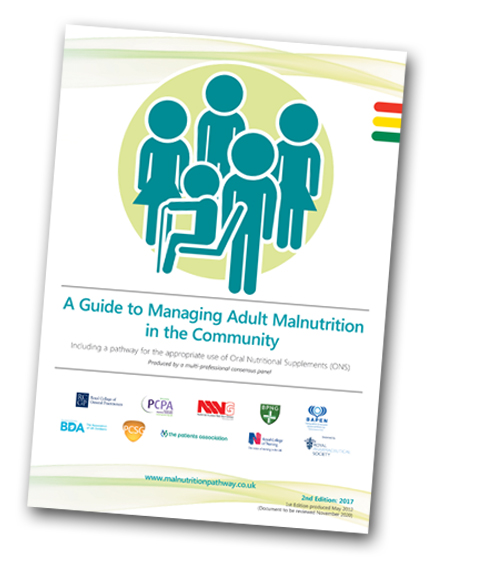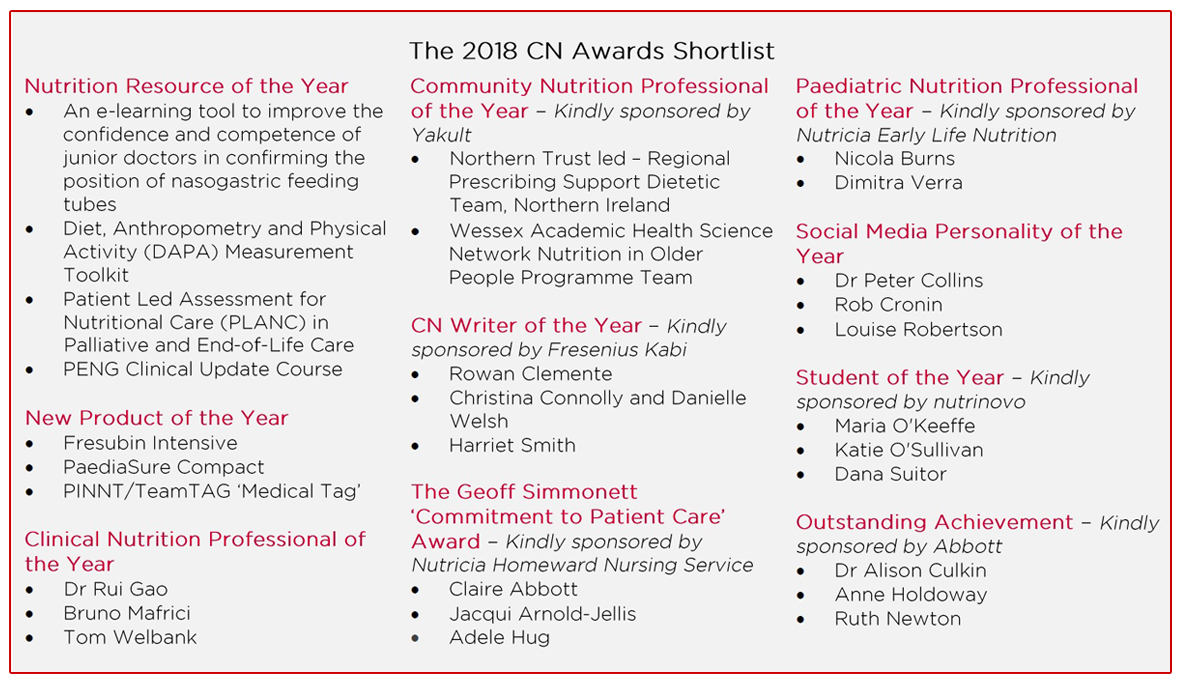News Round-up

Managing Adult Malnutrition in the Community New Updated Document and Supporting Materials Now Available
The updated version of the Managing Adult Malnutrition in the Community document and supporting information is now available free to healthcare professionals via the www.malnutritionpathway.co.uk website.
It is estimated that there are more than three million people in the UK at risk of disease-related malnutrition at any one time and that the vast majority of these (93%) live in the community.1 ‘At risk’ groups include those with chronic disease such as cancer, individuals suffering from dementia, patients with an acute illness and those recently discharged from hospital.1, 2 The recent All-Party Parliamentary Group (APPG) on Hunger report focusing on ‘Hidden Hunger and Malnutrition in the Elderly’3 highlighted the need to screen patients in all levels of care in order to address the growing burden malnutrition is placing on the NHS and social care.
In order to address the issue of malnutrition (undernutrition) in the community an expert multi-disciplinary panel first came together in 2012 to produce a practical guide to assist community healthcare professionals in identifying and managing malnutrition and an updated version of the document is now available. The panel has liaised closely with key stakeholders involved in the care of patients with malnutrition in the community to ensure the documents are relevant to all healthcare professionals working in the community. Patient representatives were also consulted to develop the content of the patient and carer resources produced.
The guide ‘Managing Adult Malnutrition in the Community’ has been developed by a multi-professional team of expert practitioners and is endorsed by key organisations, including the Royal College of General Practitioners (RCGP), the Royal College of Nursing (RCN) and the British Dietetic Association (BDA).4 The document is based on clinical experience and evidence alongside accepted best practice and includes a pathway to assist in the appropriate use of oral nutritional supplements. Healthcare professionals managing patients who have had a recent stay in hospital should find it particularly useful.
The document has received the following National Institute for Health and Care Excellence (NICE) endorsement statement:
Managing Adult Malnutrition in the Community: This booklet supports the implementation of recommendations in the NICE guideline on nutrition support for adults (www.nice.org.uk/guidance/cg32).
It also supports statements 1, 2 and 5 in the NICE quality standard for nutrition support in adults (www.nice.org.uk/guidance/qs24). (NICE, December 2017)
The document includes:
- An overview of malnutrition including its clinical consequences, cost implications, details on the prevalence across healthcare settings and information on key patient groups at risk
- Information on the identification and management of malnutrition according to risk category using ‘MUST’
- Guidance on optimising nutritional intake including dietary advice and the appropriate use of oral nutritional supplements
- A practical pathway on the appropriate use of oral nutritional supplements in the management of malnutrition.
A number of updated supporting documents are also available.
Visit: www.malnutritionpathway.co.uk.
References: 1. Elia M and Russell CA. Combating Malnutrition: Recommendations for Action. Report from the advisory group on malnutrition, led by BAPEN. 2009; 2. Stratton RJ et al. Disease-related malnutrition: an evidence-based approach to treatment. Oxford: CABI publishing; 2003.; 3. All Party Parliamentary Group on Hunger. Hidden Hunger and Malnutrition in the Elderly. January 2018; www.frankfield.co.uk/upload/docs/Hidden%20hunger%20and%20malnutrition%20in%20the%20elderly.pdf.; 4. The document and supporting patient materials have been endorsed by the following associations: British Association for Parenteral and Enteral Nutrition; BDA; British Pharmaceutical Nutrition Group; National Nurses Nutrition Group; Primary Care Pharmacists Association; Primary Care Society for Gastroenterology; RCGP; RCN; Royal Pharmaceutical Society; The Patients Association.
Some Types of Fibre More Beneficial for Gut Health than Others
Fibres found in specific foods, such as wheat, legumes, garlic and onions, may be more beneficial for gut health than fibres from some other fruits and vegetables, according to an analysis of 64 studies undertaken by researchers at King's College London.
The study found that certain types of fibre, known as prebiotics, had a more significant impact on the microbiome (the community of micro-organisms, such as bacteria, found in the body) than the general types of fibre found in foods such as brown rice, fruit, and potatoes.
Prebiotic fibre is used by the body to feed 'good bacteria' in the digestive system. The analysis showed that, compared to other types of fibre, the consumption of prebiotic fibres resulted in higher levels of 'good bacteria' Bifidobacterium and Lactobacillus in the gut. These bacteria are required for a healthy digestive system to function effectively and are already known to be found live in probiotic foods. The analysis, conducted in collaboration with academics from Bond University and the University of Queensland, is published today in the American Journal of Clinical Nutrition and examined the results from 2000 participants in all the relevant dietary intervention studies ever conducted.
Fibre can be found in a wide range of different foods with key sources being whole wheat pasta and bread, berries, broccoli and nuts. Previous studies have shown that these general types of fibre can be beneficial for health, including reducing the risk of bowel cancer and heart disease. The new analysis shows that these general fibres do not have a large effect on the type of bacteria in the gut microbiome.
By contrast, the study showed that prebiotic fibre increases the number of the good bacteria in your digestive system by feeding them. Prebiotic fibres can be found in various foods, including:
- Chicory root
- Artichoke
- Garlic
- Onion
- Wheat flour
- Beans and lentils.
The researchers did not find an increase in diversity of bacteria in the gut, irrespective of the type of fibre being investigated. The studies also did not measure the amount of fibre in people's usual diet before the studies took place and how this might impact the effects prebiotic fibres.
The researchers hope the findings can provide a basis for further research and longer studies that lead to improved and more tailored dietary advice for increasing the presence of good bacteria in the gut. This may help people with chronic diseases linked to the microbiome (such as diabetes or autoimmune diseases) and patients with conditions such as irritable bowel syndrome who may not be able to consume lots of high fibre foods without experiencing symptoms.
Commenting on the study, Professor Kevin Whelan, Head of the Department of Nutritional Sciences at King's College London and author of the paper said: "The definition of healthy eating is a balanced diet. It is not about kale and coconut oil but about eating a wide range of fruit and vegetables, whole grains and healthy fats. However, it can be difficult to ensure you are getting a sufficient amount of fibre, which is key for a healthy digestive system.
We've shown that not all dietary fibres are equal, so our findings are an important development in understanding the complexity of the gut microbiome and how it can be affected by the foods we consume, as well as how this can potentially be adapted and personalised for different people."
Associate Professor Katrina Campbell, senior author from Bond University in Australia, said the study was a step in the right direction to understanding the impact and importance of fibre on gut health: "These findings are incredibly beneficial, however further research is needed to determine the role of the entire diet and dietary patterns. We are going to enter the next phase of research which will investigate the effect different cuisines have on the gut and the role of gut health in maintaining health and preventing disease."

2018 CN Awards Shortlist Revealed…
The publishers of CN Magazines are delighted to reveal the 2018 CN Awards Shortlist.
The CN Awards provide the chance for all readers, advertisers and contributors of CN magazines to come together to recognise the achievements of those whose great work has made a significant difference within the nutrition industry – whether an individual, group or organisation.
Readers of CN Magazines* are now being asked to vote across the 10 Award categories: www.nutrition2me.com/cn-awards.
The voting process for the 2018 CN Awards closes on 23rd July 2018.
For further details on the CN Awards, visit: www.nutrition2me.com/cn-awards
* The CN Awards are run annually by the publishers of Complete Nutrition (CN) Magazines – the UK’s No.1 clinical, medical and health nutrition publications. Further details can be found at: www.nutrition2me.com/publications.
New £750k Fund Opens for Research in Gluten-free Food Production and Coeliac Disease Diagnostics and Self-care
Coeliac UK, the UK charity for people who need to live gluten-free, along with Innovate UK, the UK's innovation agency is open for applications from businesses and researchers to the £750,000 fund.
Researchers and businesses can apply for a share of the funding through three priority themes – healthcare diagnostics, digital self-care tools and better gluten-free food production – with the grants ranging from £50k to £250k. For more information see www.coeliac.org.uk/innovateuk.
Earlier in the year, as part of the charity's 50th Anniversary activities, Coeliac UK launched a Research Fund and accompanying fundraising appeal, aiming to raise £5 million to change the future for people with coeliac disease and gluten-related autoimmune conditions. For more information see: www.coeliac.org.uk/researchfund. The Fund has already received an injection of £500k from Innovate UK which, in addition to £250k from the charity, will support this new research competition.
Together with match funding from industry, the total spend on new research for a growing global market will be nearer £1m.
Sarah Sleet, chief executive of Coeliac UK said: "With the global diagnosis for coeliac disease increasing year on year, this is a chance for UK business and researchers to get ahead and develop competitive advantages in innovation which will be of benefit to a badly underserved patient group. We are thrilled to be working with Innovate UK to promote innovation that will have a real and positive impact on people's lives." Calum Murray, head of agriculture and food at Innovate UK, said: "By funding great new ideas which will help diagnose and care for people with coeliac disease and by encouraging tasty new developments in gluten-free food, this competition promises to make a real difference. Not just for those living with coeliac disease but it will help fuel innovation in our food and health sectors – crucial components of the government's industrial strategy. This competition is a first for Innovate UK in how we have teamed up with the leading charity Coeliac UK to boost the funding available for fantastic new proposals from industry and academia."
The three priority themes:
- Coeliac disease diagnostics
New methods of diagnosis which are less invasive, or that are accurate without eating gluten could improve diagnosis rates and lead to early effective treatment, in turn leading to better quality of life and reduced risk of complications for patients with the condition. - Enhanced quality of gluten-free foods
Creating more nutritious and affordable gluten-free food could include; novel ingredients, foods with improved nutrient profiles and desired flavour texture characteristics, new methods of preservation, innovation in processing and manufacturing efficiency for lower cost options and technologies to improve shelf life. - Digitally supported self-care
Coeliac disease is a serious autoimmune condition which requires lifelong management. Self-care using digital tools could provide a highly cost-effective option for health management.
Find out more about this competition and to apply: www.coeliac.org.uk/innovateuk


